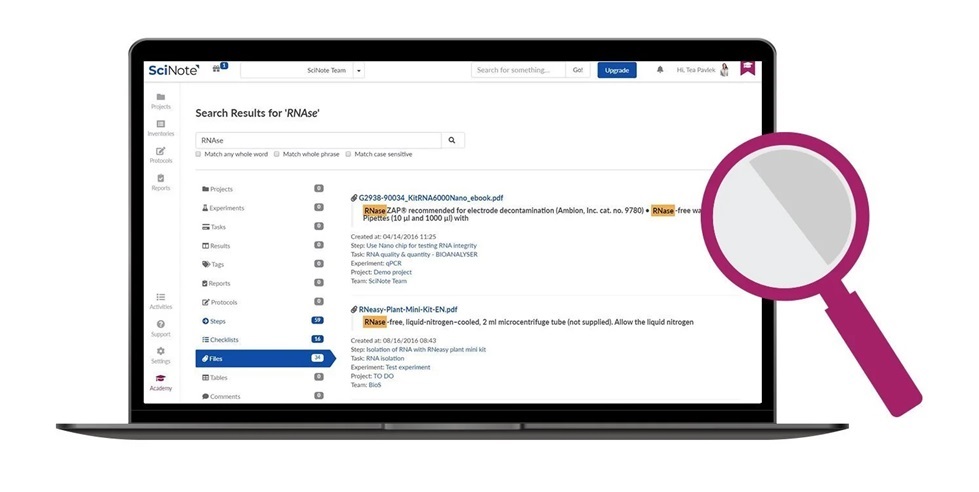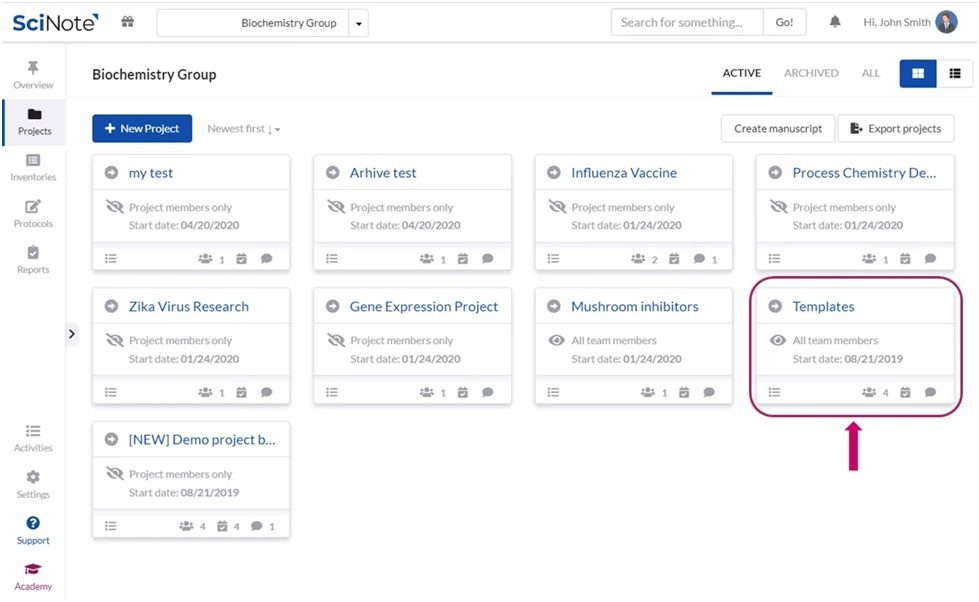Last updated on : January 3rd, 2024 by R Yadav
In the fast-paced world of scientific research and experimentation, laboratories are at the forefront of innovation. However, the traditional image of scientists in white coats huddled around test tubes is evolving. Today, laboratories are becoming increasingly digitized, thanks to the advent of cutting-edge laboratory software. In this deep dive, we explore the essentiality of laboratory software and shed light on one of its crucial components—the Electronic Lab Notebook (ELN) Software.
The Evolving Landscape of Laboratories
Laboratories have come a long way from their conventional setups. The incorporation of technology has revolutionized the way researchers and scientists work. Gone are the days of manually recording observations in paper notebooks and meticulously transcribing data. The digital era has ushered in a new age where laboratories are equipped with sophisticated software solutions to streamline processes and enhance efficiency.
Benefits of Laboratory Software
Laboratory software brings a myriad of benefits to research institutions and industries alike:
- Efficiency Boost: Digital tools significantly expedite experiments, data collection, and analysis. Researchers can perform tasks more efficiently, ultimately accelerating the pace of discoveries.
- Data Accuracy: Automation reduces the risk of human error. With laboratory software, data is recorded and analyzed with precision, minimizing the chances of inaccuracies that could compromise the integrity of research.
- Collaboration Enhancement: In a world that thrives on collaboration, laboratory software facilitates seamless sharing of data and findings among team members, regardless of their physical locations. This encourages collaborative research efforts and fosters innovation.
- Cost Savings: While the initial investment in laboratory software might seem substantial, the long-term cost savings are considerable. Efficiency gains, reduced resource wastage, and streamlined processes contribute to a positive return on investment.
The Role of Electronic Lab Notebook (ELN) Software
Among the various components of laboratory software, Electronic Lab Notebook (ELN) Software stands out as a cornerstone in the digital transformation of laboratories. An ELN is a digital version of the traditional paper laboratory notebook, but with enhanced functionalities that go beyond simple note-taking.
What is Electronic Lab Notebook (ELN) Software?
Electronic Lab Notebook (ELN) Software is a digital platform designed to replace traditional paper notebooks in laboratory settings. It allows researchers to record, organize, and manage their experiments and data electronically. ELN software is not just a digital replica of its paper counterpart; it brings a host of features that significantly elevate the research process.
Key Features of ELN Software
- Data Organization: ELN software provides a structured framework for organizing experimental data. Researchers can categorize information based on projects, experiments, and other parameters, making it easy to retrieve and analyze data when needed.
- Collaboration Tools: ELN software promotes collaboration by allowing multiple users to access and contribute to the same set of data. This real-time collaboration ensures that all team members are on the same page, fostering a collaborative and cohesive research environment.
- Integration Capabilities: ELN software seamlessly integrates with other laboratory instruments and software, creating a unified ecosystem. This integration enhances workflow efficiency by automating data transfer and reducing manual data entry.
- Search and Retrieval: Advanced search functionalities make it effortless for researchers to find specific information within a vast repository of data. ELN software enables quick retrieval of relevant data, saving valuable time and effort.
- Security Measures: Recognizing the sensitivity of research data, ELN software often comes with robust security features. Encryption, access controls, and audit trails ensure that data remains secure and compliant with regulatory standards.
The Impact of ELN Software on Laboratory Workflows
The adoption of Electronic Lab Notebook (ELN) Software has far-reaching implications for laboratory workflows. Let's delve into the ways ELN software transforms and optimizes daily research activities.
Streamlined Data Entry:
- ELN software eliminates the need for manual data entry, reducing the risk of transcription errors.
- Researchers can input data directly from laboratory instruments, ensuring accuracy and efficiency.
Enhanced Collaboration:
- Real-time collaboration features facilitate seamless communication among team members.
- Researchers can share experimental protocols, results, and insights, promoting a collaborative research environment.
Efficient Experiment Design and Planning:
- ELN software allows researchers to plan experiments, set parameters, and define methodologies in a structured manner.
- Experiment templates and pre-configured protocols streamline the process of designing and executing experiments.
Data Analysis and Visualization:
- ELN software often comes equipped with tools for data analysis and visualization.
- Researchers can generate graphs, charts, and reports within the platform, simplifying the interpretation of complex data sets.
Regulatory Compliance:
- ELN software helps laboratories adhere to regulatory standards by providing features like electronic signatures and audit trails.
- The digital nature of ELN facilitates easy documentation and traceability, essential for compliance with industry regulations.
Choosing the Right ELN Software
Selecting the appropriate Electronic Lab Notebook (ELN) Software is a critical decision for any laboratory. The market offers a diverse range of ELN solutions, each catering to specific needs. Here are key considerations when choosing ELN software:
User-Friendly Interface:
- A user-friendly interface ensures that researchers can quickly adapt to the software, maximizing its utility.
- Intuitive navigation and a well-designed layout contribute to a positive user experience.
Scalability:
- The chosen ELN software should be scalable to accommodate the evolving needs of the laboratory.
- It should support the integration of new features and modules as the research scope expands.
Integration Capabilities:
- Compatibility with existing laboratory instruments and software is crucial for seamless workflow integration.
- The ELN software should support API (Application Programming Interface) integration for enhanced interoperability.
Data Security Measures:
- Robust data security features, including encryption and access controls, are imperative to protect sensitive research data.
- Compliance with industry regulations and data privacy standards should be a priority.
Collaboration Features:
- Evaluate the collaboration tools offered by the ELN software, such as real-time editing, commenting, and sharing capabilities.
- Effective collaboration features contribute to a more cohesive and productive research environment.
Vendor Support and Updates:
- Choose ELN software from reputable vendors that provide reliable customer support and regular software updates.
- Ongoing support ensures that the software remains up-to-date with the latest features and security patches.
The Future of Laboratory Software and ELN Adoption
As technology continues to advance, the future of laboratory software, including Electronic Lab Notebook (ELN) Software, holds exciting possibilities. Here are some trends shaping the future landscape:
Artificial Intelligence (AI) Integration:
- The integration of AI in ELN software is poised to revolutionize data analysis and interpretation.
- AI algorithms can assist researchers in identifying patterns, predicting outcomes, and extracting valuable insights from large datasets.
Cloud-Based Solutions:
- The shift towards cloud-based ELN solutions allows for increased flexibility, accessibility, and collaboration.
- Cloud-based platforms enable researchers to access and contribute to data from anywhere, fostering a more connected research community.
IoT (Internet of Things) Integration:
- IoT devices and sensors in laboratories can seamlessly integrate with ELN software for real-time data collection.
- This integration enhances the accuracy and immediacy of data, contributing to more dynamic and responsive research processes.
Conclusion
The digital transformation of laboratories through the adoption of laboratory software, especially Electronic Lab Notebook (ELN) Software, marks a paradigm shift in the way research is conducted. The efficiency gains, collaboration enhancements, and data accuracy provided by ELN software contribute significantly to the progress of scientific endeavors.
Read Next: Dynamics of Affiliate Marketing: Navigating Success with Tracking Software


